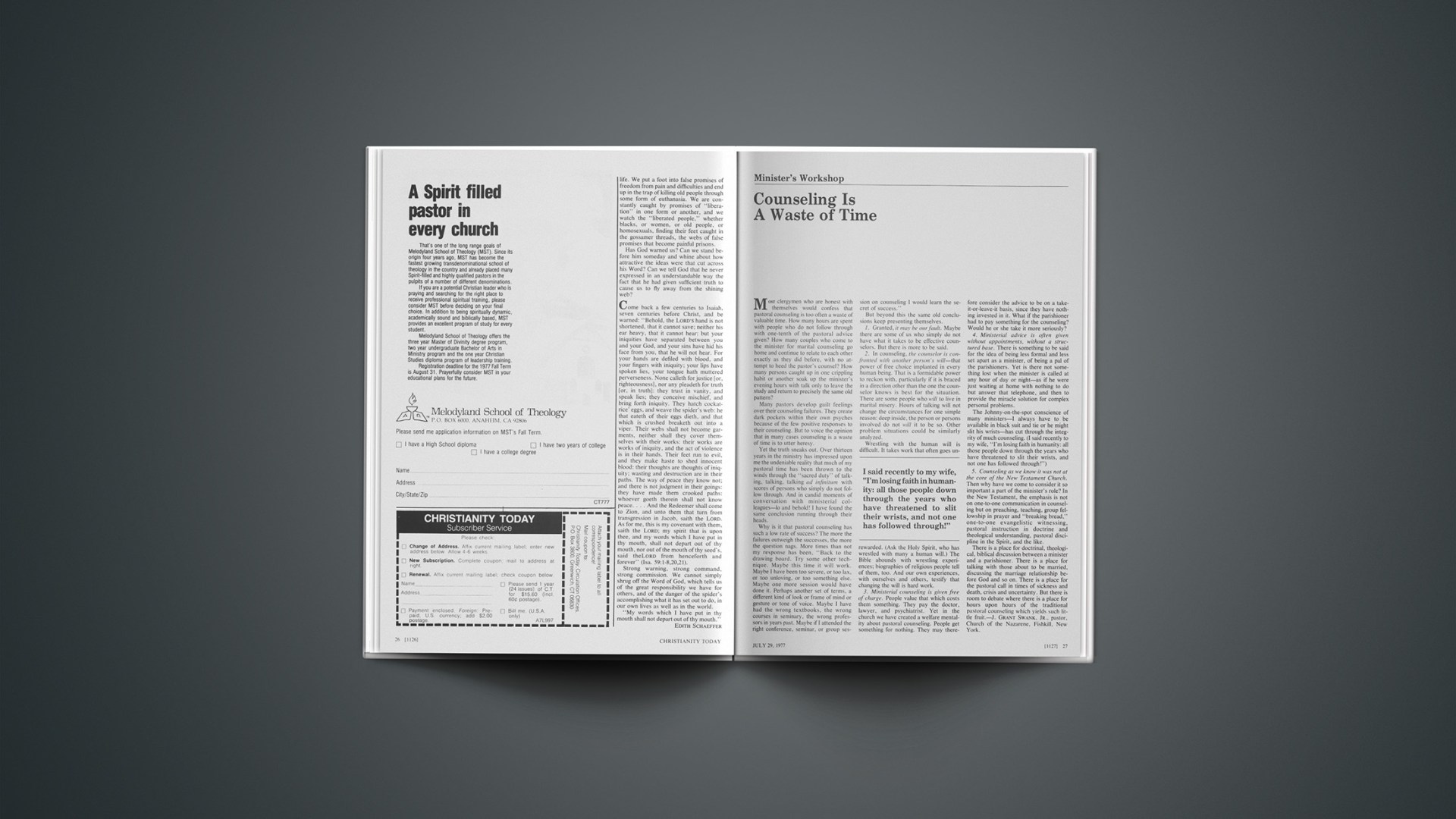Most clergymen who are honest with themselves would confess that pastoral counseling is too often a waste of valuable time. How many hours are spent with people who do not follow through with one-tenth of the pastoral advice given? How many couples who come to the minister for marital counseling go home and continue to relate to each other exactly as they did before, with no attempt to heed the pastor’s counsel? How many persons caught up in one crippling habit or another soak up the minister’s evening hours with talk only to leave the study and return to precisely the same old pattern?
Many pastors develop guilt feelings over their counseling failures. They create dark pockets within their own psyches because of the few positive responses to their counseling. But to voice the opinion that in many cases counseling is a waste of time is to utter heresy.
Yet the truth sneaks out. Over thirteen years in the ministry has impressed upon me the undeniable reality that much of my pastoral time has been thrown to the winds through the “sacred duty” of talking, talking, talking ad infinitum with scores of persons who simply do not follow through. And in candid moments of conversation with ministerial colleagues—lo and behold! I have found the same conclusion running through their heads.
Why is it that pastoral counseling has such a low rate of success? The more the failures outweigh the successes, the more the question nags. More times than not my response has been, “Back to the drawing board. Try some other technique. Maybe this time it will work. Maybe I have been too severe, or too lax, or too unloving, or too something else. Maybe one more session would have done it. Perhaps another set of terms, a different kind of look or frame of mind or gesture or tone of voice. Maybe I have had the wrong textbooks, the wrong courses in seminary, the wrong professors in years past. Maybe if I attended the right conference, seminar, or group session on counseling I would learn the secret of success.”
But beyond this the same old conclusions keep presenting themselves.
1. Granted, it may be our fault. Maybe there are some of us who simply do not have what it takes to be effective counselors. But there is more to be said.
2. In counseling, the counselor is confronted with another person’s will—that power of free choice implanted in every human being. That is a formidable power to reckon with, particularly if it is braced in a direction other than the one the counselor knows is best for the situation. There are some people who will to live in marital misery. Hours of talking will not change the circumstances for one simple reason: deep inside, the person or persons involved do not will it to be so. Other problem situations could be similarly analyzed.
Wrestling with the human will is difficult. It takes work that often goes unrewarded. (Ask the Holy Spirit, who has wrestled with many a human will.) The Bible abounds with wrestling experiences; biographies of religious people tell of them, too. And our own experiences, with ourselves and others, testify that changing the will is hard work.
3. Ministerial counseling is given free of charge. People value that which costs them something. They pay the doctor, lawyer, and psychiatrist. Yet in the church we have created a welfare mentality about pastoral counseling. People get something for nothing. They may therefore consider the advice to be on a take-it-or-leave-it basis, since they have nothing invested in it. What if the parishioner had to pay something for the counseling? Would he or she take it more seriously?
4. Ministerial advice is often given without appointments, without a structured base. There is something to be said for the idea of being less formal and less set apart as a minister, of being a pal of the parishioners. Yet is there not something lost when the minister is called at any hour of day or night—as if he were just waiting at home with nothing to do but answer that telephone, and then to provide the miracle solution for complex personal problems.
The Johnny-on-the-spot conscience of many ministers—I always have to be available in black suit and tie or he might slit his wrists—has cut through the integrity of much counseling. (I said recently to my wife, “I’m losing faith in humanity: all those people down through the years who have threatened to slit their wrists, and not one has followed through!”)
5. Counseling as we know it was not at the core of the New Testament Church. Then why have we come to consider it so important a part of the minister’s role? In the New Testament, the emphasis is not on one-to-one communication in counseling but on preaching, teaching, group fellowship in prayer and “breaking bread,” one-to-one evangelistic witnessing, pastoral instruction in doctrine and theological understanding, pastoral discipline in the Spirit, and the like.
There is a place for doctrinal, theological, biblical discussion between a minister and a parishioner. There is a place for talking with those about to be married, discussing the marriage relationship before God and so on. There is a place for the pastoral call in times of sickness and death, crisis and uncertainty. But there is room to debate where there is a place for hours upon hours of the traditional pastoral counseling which yields such little fruit.—J. GRANT SWANK, JR., pastor, Church of the Nazarene, Fishkill, New York.










